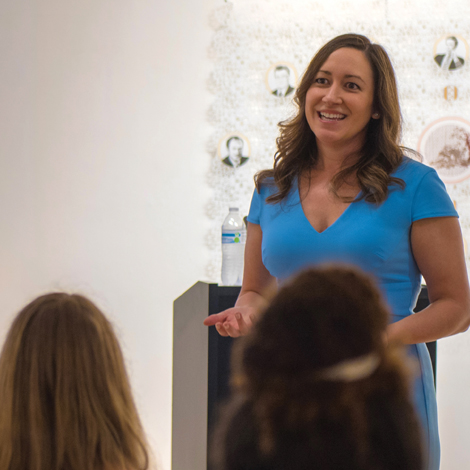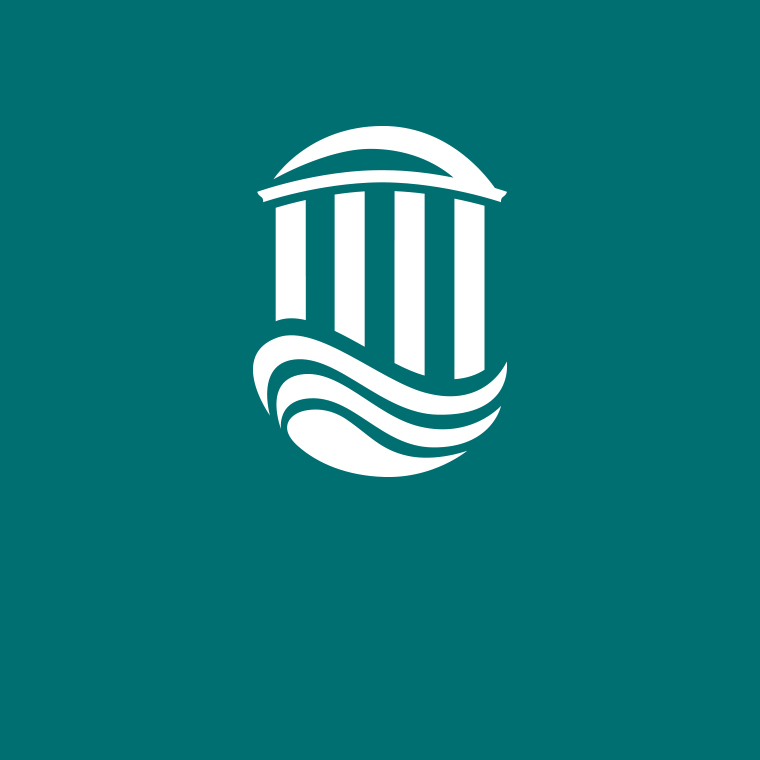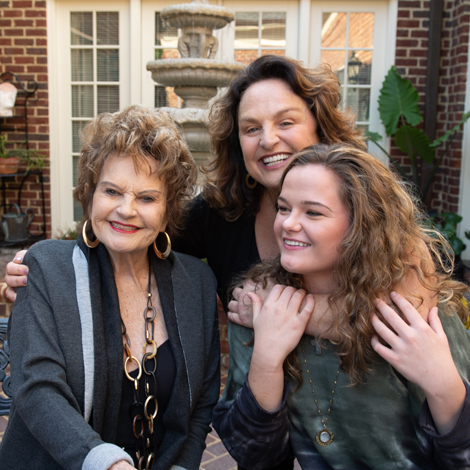Community Through Unity
Area mayors gather on CCU stage to discuss leadership, collaboration, and civic engagement.
By Michael Kane
Photos by CCU Photography
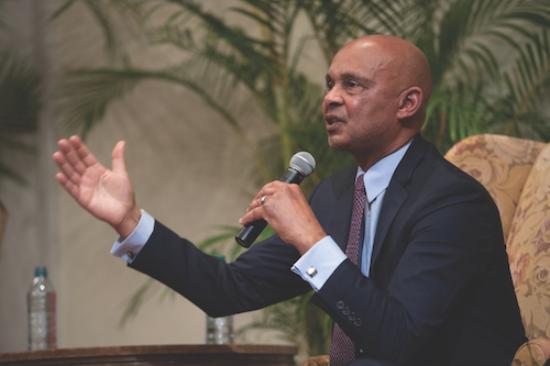 Leaders of four major Grand Strand cities are seated onstage at CCU’s Johnson Auditorium in the Wall College of Business. Microphones are on, and the audience of more than 100 students, faculty, and community members pay rapt attention to the group of civic leaders. Rather than speaking from a podium, however, the mayors are gathered in a semicircle of upholstered chairs within a warm environment of ferns and potted palms. They’ve greeted one another with hugs and pats on the back as if meeting up with old friends. Far from a debate about policy, this is a conversation about community, and the mayors are primed and eager for spontaneous discussion.
Leaders of four major Grand Strand cities are seated onstage at CCU’s Johnson Auditorium in the Wall College of Business. Microphones are on, and the audience of more than 100 students, faculty, and community members pay rapt attention to the group of civic leaders. Rather than speaking from a podium, however, the mayors are gathered in a semicircle of upholstered chairs within a warm environment of ferns and potted palms. They’ve greeted one another with hugs and pats on the back as if meeting up with old friends. Far from a debate about policy, this is a conversation about community, and the mayors are primed and eager for spontaneous discussion.
Barbara Jo Blain-Bellamy, mayor of Conway; Brendon Barber, mayor of Georgetown; Brenda Bethune, mayor of Myrtle Beach; and Marilyn Hatley, mayor of North Myrtle Beach, participated in this roundtable discussion in January 2020 to share information about current projects and collaborations between their respective cities and CCU’s Edwards College for Humanities and Fine Arts. Sara Sobota, CCU publications editor and senior lecturer of English, moderated a two-hour conversation that ranged from opportunities for public art and the importance of civic service to complex issues such as ocean drilling and homelessness.
Barber discussed the ongoing collaboration between the city of Georgetown and CCU students through Georgetown RISE as a United Nations Regional Centre of Expertise on Education for Sustainable Development. For years, Barber and city officials have worked with Pam Martin, professor in the Department of Politics, and her students to enhance knowledge, research, and experiential learning on sustainable development in Georgetown. The program was founded in 2017 and has involved internships, innovative programming, and an ongoing focus on civic sustainability. In addition, Barber enrolled in Martin’s Summer 2019 course, Sustainable Development in Georgetown, and attended nearly every class meeting.
“I knew partnering with Coastal Carolina University was the right step for the city of Georgetown,” Barber said. “The energy of students who come from CCU is incredible. It gives me a vision of what we can accomplish in Georgetown; they come ready.”
Bethune spoke at length on the development of the arts and innovation district being implemented in Myrtle Beach. The area’s new theater, currently in the planning stages, will provide another outlet for CCU theatre students to develop and perform their craft. She also discussed “Liberation City,” a collaborative project between the CCU Department of Theatre and Project Lighthouse, a drop-in center for homeless youth in Horry County. The theatrically devised event, involving CCU students and participants with Project Lighthouse, is designed to engage audience members in civic dialogue and re-imagining.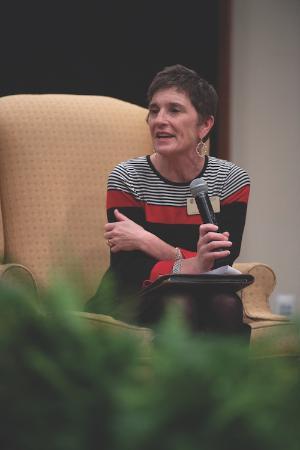
“‘Liberation City’ is an opportunity for all of our cities to come together,” said Bethune. “It allows us to educate the community about the issue of homelessness and get everyone involved with it.”
Blain-Bellamy, who was the December 2018 CCU commencement speaker, discussed the March 2020 Gullah-Geechee and Conway Community Day as a prime example of the collaborative relationship between her city and the institution. The second annual event was developed through CCU’s Charles Joyner Institute for Gullah and African Diaspora Studies in conjunction with the Athenaeum Press, a student-driven publishing lab. The event not only highlights the cultural heritage inherent in the Grand Strand area, but also showcases various artistic creations from Gullah culture such as dance, music, and art.
“The Gullah Geechee conference was a remarkable opportunity to celebrate the value we bring to the area as well as the talent and vision that CCU faculty, staff, and employees offer to our city,” said Blain-Bellamy. “When you consider the whole [Gullah Geechee] corridor of which we are a part, and all the elements of that culture that are still alive and thriving, I think we can’t help but celebrate at least annually.”
The mayoral discussion also touched on local issues and student advocacy through CCU experiential learning classes. Hatley maintains a strong stance against offshore drilling and has worked alongside CCU students through an organization called Stop Offshore Drilling in the Atlantic (SODA).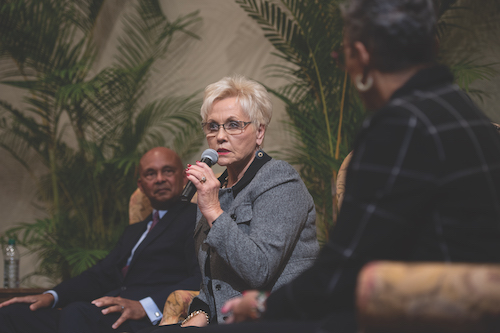
Hatley both praised and challenged students and community members to maintain an active voice in area issues and initiatives.
“The best way to make a change is to get involved in your local communities,” said Hatley. “Whether you’re a current college student or a retiree, not only will you make a change in other people’s lives, but more importantly, they’ll make an impact on yours as well.”
Students heard this message loud and clear, and they also sensed the sincerity of the mayors’ stories and advice.
“The mayors see themselves as public servants, with their words and goals reflecting such,” said Gabrielle Sellers, junior English major. “Also, there was a great sense of familiarity and support among the mayors and the audience at this event.”
Claudia Bornholdt, dean of the Edwards College, noted that the event corresponds to her vision for the future.
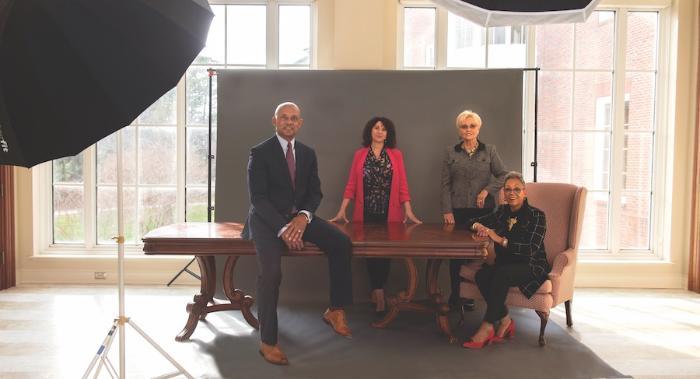 “One of my priorities as new dean is to more deeply connect our students and programs with the local communities,” said Bornholdt. “I look forward to working with all of them in the years to come, because there are so many opportunities for us to serve the local community and to create hands-on experiences for our students.”
“One of my priorities as new dean is to more deeply connect our students and programs with the local communities,” said Bornholdt. “I look forward to working with all of them in the years to come, because there are so many opportunities for us to serve the local community and to create hands-on experiences for our students.”
Following the discussion, Sobota opened the floor for questions from the audience, and numerous students stepped up, asking about issues of importance to them and allowing the mayors to elaborate on their vision and approaches to societal challenges such as sex trafficking and homelessness.
As the event concludes, the mayors move through the audience to shake hands and speak to those in attendance on a more personal level. Spread out among the audience, they fill the room with their energy and inspiration as individual discussions result in promises of future connection. If even a fraction of the ideas and plans discussed this evening come to fruition, the collaborative potential of CCU and surrounding communities is infinite.







